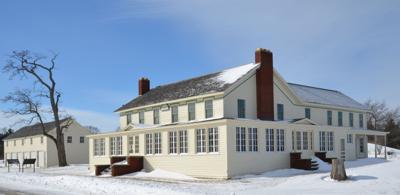GLEN HAVEN — Margaret and Jeff Kato never thought their retirement years would be spent running a bed and breakfast, but now believe it was meant to be.
The nonprofit Balancing Environment and Rehabilitation formed in 2018 by the Katos recently secured a 40-year lease to rehabilitate and open the historic Sleeping Bear Inn and Garage located on Lake Michigan in Glen Haven, once a port village.
“We were thinking about what our next chapter would be,” said Margaret Kato, executive director of BEAR. “We certainly didn’t think it would be this.”
The couple vacationed in Leelanau for many years. They came upon the empty inn by accident when they went straight on M-109 instead of turning east toward Glen Arbor.
“I thought, ‘Why is this sitting here?’” Kato said.
She later came across an article that said, “You could be the innkeeper” and the wheels were set in motion. Jeff has restaurant management experience and they both know what it takes to rehab homes and buildings.
The Katos both retired in 2020 from Genesee County Habitat for Humanity, where she was executive director and he was operations manager. They moved to the Glen Arbor area from Flushing in September.
A groundbreaking and open house will be held at 1 p.m. Fri., April 8, after which construction will start.
“We wanted people from the community to have the opportunity to see the inn one last time before we started,” Kato said.
George MacEachern, who worked with the Katos at Habitat, has been hired to manage construction. Also retired, MacEachern will focus only on this project, Kato said. The restoration is expected to take up to 18 months before the inn is fully operational and is expected to cost about $2 million, Kato said.
Once finished it will be the oldest leased structure in the National Park Service, said Bob Bertschy, facilities manager for the National Park Service and chief of maintenance for Sleeping Bear Dunes National Lakeshore.
“It is going to be a very big deal for visitors,” Bertschy said. “It will provide a new experience for visitors to the area.”
The Lakeshore has been looking for a lessee for the inn since at least 2013, when the first call went out seeking proposals, Bertschy said. The response was minimal and a second call went out in 2016, he said.
“That’s when we started to get a little more traction and a little more interest in it,” Bertschy said.
The restored inn will have eight rooms, each with a private bathroom, as well as a kitchen and dining area. It will start as a bed and breakfast and will eventually be open for public dining.
The inn was added to the National Register of Historic Places in 1928, which is also the year the porch was enclosed and heat and electricity were added, Kato said. It is also the era the decor will follow, using arts and crafts- or mission-style furnishings.
“The inn was a frontier inn,” she said. “It was never fancy.”
All of the restoration plans had to be approved by the NPS and by the State Historic Preservation Office.
“We had to go through the prints and make sure they followed all the historic guidelines put out by SHPO,” Bertschy said.
The character of the building has to be maintained inside and out, he said, but the inn also has to be modernized and made safe.
Kato said profits from the operations of the inn will be used to renovate other Lakeshore properties, including tennis courts and a curling rink in Glen Haven, which are overgrown.
“We would like visitors to be immersed in the history of the area. All of this belongs to all of us.”
Kato is also a seamstress and has thought about making some 1928-era costumes. It’s an idea she hasn’t had time to execute, she said.
The inn opened in 1867 and operated for more than 100 years before closing in the mid 1970s. It was built by C.C. McCarty, who also built a sawmill, and was later sold to D.H. Day, who purchased several properties including the village of Glen Haven. Day used his savings and money borrowed from Perry Hannah, who is considered the founding father of Traverse City.
It started as a frontier hotel for those traveling on business and a boarding house for loggers and men who worked in the Glen Haven cannery, as well as for sailors.
“Sailors would stay there if they needed to be on the mainland for a period of time or if they were sick,” Bertschy said. Ships would pick them back up the next time they were in port, he said.
Glen Haven was acquired by the Lakeshore in 1972 and for about four years supplied seasonal housing for park employees. Since 1976 the building has been empty.
“We’re really excited to participate with a nonprofit group that has so much experience in the rehabilitation and maintenance of historic structures,” Bertschy said. “The people it’s going to benefit the most is the public.”





















